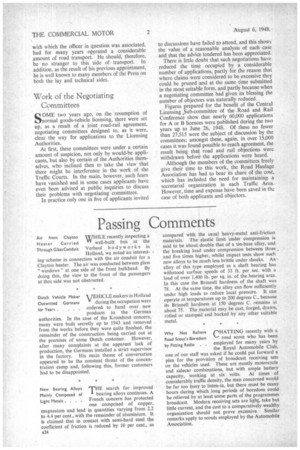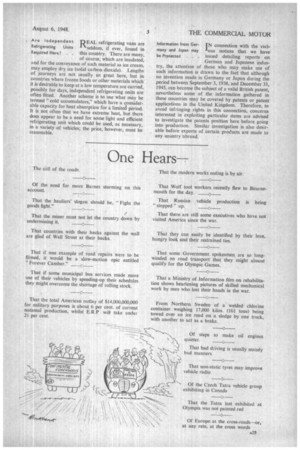Passing Comments
Page 26

Page 27

If you've noticed an error in this article please click here to report it so we can fix it.
Air from Clayton WHILE recently inspecting a Heater Carried " well-built bus at the Through Glass Conduit Verheul bodyworks in Holland, we noted an interesting scheme in connection with the air conduit for a Clayton heater. The air was conducted between glass " windows " at one side of the front bulkhead. By doing this, the view to the front of the passengers at that side was not obstructed.
Dutch Vehicle Maker JEHICLE makers in Holland Outwitted Germans v during the occupation were for Years ordered to hand over new
products to the German authorities. In the case of the Krornhout concern, many were built secretly up to 1943 and removed from the works before they were quite finished, the remainder of the construction being carried out at the premises of some Dutch customer. However, after many complaints at the apparent lack of production, the Germans installed a strict supervisor in the factory. His main theme of conversation appeared to be the constant threat of the concentration camp and, following this, former customers had to be disappointed.
New Bearing Alloys "THE search for improved Mainly Composed of A bearing alloys continues. A Light Metals. . French concern has protected one comprised of copper, magnesium and lead in quantities varying from 2.2 to 4.4 per cent., with the remainder of aluminium. It is claimed that in contact with semi-hard steel the coefficient of friction is reduced by 10 per cent., as A24
compared with the usual heavy-metal anti-friction materials. The elastic limit under compression is said to be about double that of a tin-base alloy, and the breaking load under compression between three and five times higher, whilst impact tests show such new alloys to be much less brittle under shocks. An alloy of this type employed as a shaft bearing has withstood surface speeds of 33 ft. per sec, with a load of over 1,400 lb. per sq. in. of the bearing area. In this case the Brinnell hardness of the shaft was 78. At the same time, the alloy can flow sufficiently under high loads to reduce local pressure. It can operate at temperatures up to 200 degrees C., because its Brinnell hardness at 150 degrees C. remains at about 75. The material may be cast, forged, drawn, rolled or stamped and backed by any other suitable metal.
CHATTING recently with a `..." road scout who has been employed for many years by the Royal Automobile Club, one of our staff was asked if he could put forward a plea for the provision of broadcast receiving sets on the vehicles used. These are mostly motorcycle and sidecar combinations, but with ample battery capacity, working at six volts. At times of considerably traffic density, the men concerned would be far too busy to listen-in, but there must be many hours during which long periods of boredom could be relieved by at least some parts of the programmes broadcast. Modern receiving sets are light, take but little current, and the cost to a comparatively wealthy organization should not prove excessive. Similar remarks apply to scouts employed by the Automobile Association.
Why Not Relieve Road Scout's Boredom by Fitting Radio . .
REAL refrigerating vans are "seldom, if ever, found in this country. There are many, of course, which are insulated, and for the conveyance of such material as ice cream, may employ dry ice (solid carbon dioxide). Lengths of journeys are not usually so great here, but in countries where frozen foods or other materials which it is desirable to keep at a low temperature are carried, possibly for days, independent refrigerating units are often fitted. Another scheme is to use what may be termed "cold accumulators," which have a considerable capacity for heat absorption for a limited period. It is not often that we have extreme heat, but there does appear to be a need for some light and efficient refrigerating unit which could be used, as necessary, in a variety of vehicles; the price, however, must be reasonable.
Are independent Refrigerating Units Required Here? . .
information from GerIN connection with the vari many and Japan may ous notices that we have be Protected . . . issued detailing reports on
German and Japanese industry, the attention of those who may make use of such information is drawn to the fact that although no invention made in Germany or Japan during the period between September 3, 1938, and December 31, 1945, can become the subject of a valid British patent, nevertheless some of the information gathered in these countries may be covered by patents or patent applications in the United Kingdom. Therefore, to avoid infringing rights in this connection, concerns interested in exploiting particular items are advised to investigate the patents position here before going into production. Similar investigation is also desirable before exports of certain products are made to any country 'abroad.




















































































